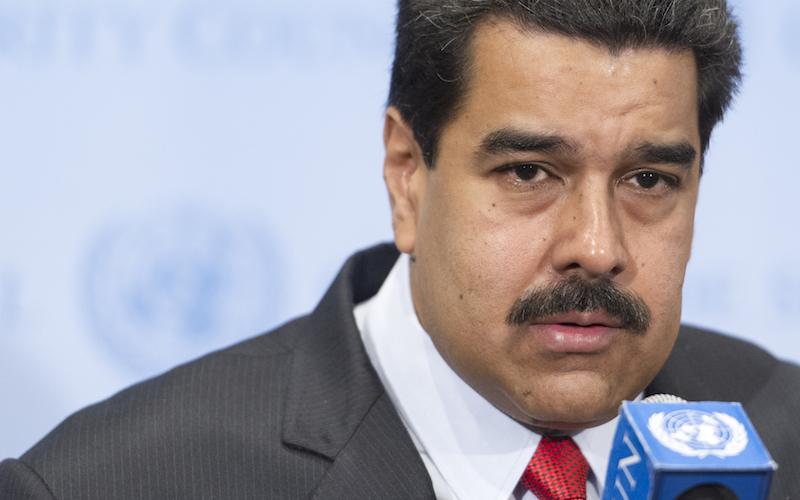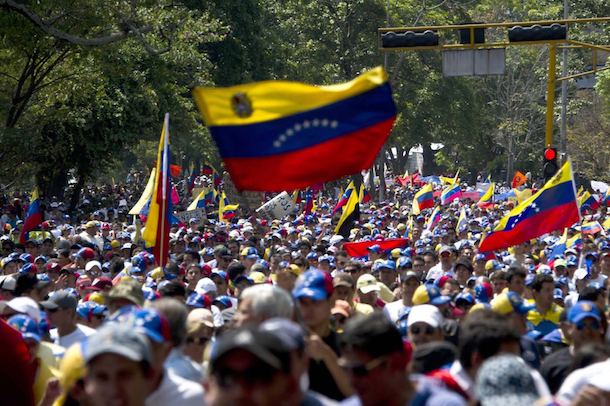
Russia & Venezuela: From Allies to Patronage?
Venezuela’s political and economic meltdown continues while President Nicolas Maduro’s priority is to remain in power. Meanwhile, Russia continues its involvement in Ukraine, Syria and ongoing tensions with the U.S. and Western Europe. Given these situations, is the Moscow-Caracas relationship over? Or has it transformed? And what role do other actors in the global community play in its endurance?
Some Background
Due to space considerations we cannot carry out a detailed discussion about the evolution of Venezuela-Russia relations; suffice to say, if we were writing this article a decade ago, the situation would be drastically different. Back then, bilateral relations were known worldwide due to an economically thriving Venezuela’s acquisition of billions of dollars of Russian military equipment. The equipment included warplanes, different types of tanks and armored vehicles, as well as rifles, like the infamous Kalashnikov and Dragunov sniper rifles. Additionally, in 2008, a Russian fleet travelled to the Caribbean to carry out naval exercises with the Venezuelan Navy, the first time Russian warships had travelled to the Western Hemisphere since the Cold War. Years later, in 2013, two Russian Tu-160 strategic bombers arrived in Venezuela.
Apart from military relations, the two countries enjoyed strong diplomatic ties, particularly given the friendship between the leaders of the two countries, the late President Hugo Chavez and both President Vladimir Putin and President Dmitry Medvedev.
As a sign of its friendship with Moscow, the South American nation became the third nation to recognize South Ossetia and Abkhazia, two separatist regions that became independent after the 2008 Russo-Georgian war, as independent nations. Then-president Hugo Chavez announced in 2009 that not only would his country recognize the two regions as independent, but that he would begin to establish diplomatic relations with them. This was much to the pleasure of then-President Medvedev, who applauded and thanked Chavez for the important declaration. Putin, who was Prime Minister at the time, met with Chavez and praised him for the decision as well, stressing that it was an example of effective coordination of the two countries’ efforts in the global arena, and a support of Russia’s aspirations for more democratic international relations.
Diplomatic Relations
Nowadays, the relationship between the two leaders, President Putin and President Nicolas Maduro, does not appear to be as close as was the case with the latter’s predecessor. However, the two heads of state are known to have held various telephone conversations, which are rather significant, as they have led to new business ventures and other mutually beneficial projects between the two countries. The most recent reported conversation occurred in July, during which President Putin reportedly praised how Venezuela is Russia’s second commercial partner in Latin America.
During a press conference on 22 August, President Maduro announced plans to visit Russia to discuss the growth of oil and gas investments between the two countries.
Additionally, occasional meetings between the two governments continue to occur. For example, Venezuelan Foreign Affairs Minister Delcy Rodriguez travelled in February to Moscow to meet her Russian counterpart, Sergey Lavrov. Shortly after, Defense Minister Padrino Lopez travelled in April and met with Minister Sergey Shoigu. It is also worth noting that Caracas has sided with Moscow at the United Nations Security Council, as Venezuela was a recent non-permanent member; for example, Venezuela joined China and Russia in voting against a UN resolution to call for a cease fire in Aleppo, Syria, in December 2016.
Russia and Venezuela have been close diplomatic and business partners since 1999, and although Maduro’s coming to power in Venezuela is bringing along with it many changes, close ties with Russia remain a priority.
Military Relations?
Given Venezuela’s ongoing economic turmoil, the country is no longer able to continue purchasing large quantities of Russian military equipment (it is unclear when Venezuela acquired 5,000 MANPADS, as Reuters reported in May), though recent reports hint at Caracas continuing to acquire Chinese platforms.
The support of the armed forces is a key component for the survival of any government, which is often bolstered by a continuous robust defense budget and new military equipment. However, no recent purchases have been reported. This is unsurprising, given the secrecy of the Venezuelan government in particular, and the arms trade in general. Nevertheless, because of the country’s economic status, it is more likely that the government cannot any longer afford large expenditures. In an interview with the authors, Dr. Evan Ellis, Latin America Research Professor with the U.S. Army War College, explained that “Rosboronexport continues to overhaul engines and do other work on Venezuela’s Mi-35s and Su-30s, and has talked about the consummation of a new sale of 13 additional Su-30s…yet it is not clear whether these sales will take place, and the Venezuelan military is reportedly frustrated with the long time required for equipment overhauls due to the need to ship items to Russia to perform the work, as well as other aspects of Russian maintenance support and some equipment quality issues.”
In August, due to ongoing criticism from the U.S., President Maduro praised his country’s defense relations with Moscow, stating that thanks to them (and Russian platforms), Venezuela has created a “military fortress” to defeat any possible attacker. The authors would argue that Venezuela’s current economic situation makes it unlikely that it can continue purchasing new Russian defense platforms, while Moscow is unwilling to donate high-tech equipment to a friendly government. In the near future, we may see China edging out Russia, and Beijing may be more willing to provide defense platforms at discounted prices.
Business and Trade Relations
Commercial relations between the two countries deserve focus, as there have been interesting developments in recent months. With increased sanctions (see the U.S. Treasury Department’s Issuance of Venezuela-related Executive Order and Associated General Licenses, dated 25 August) and threats against Venezuela following the controversial vote for a constitutional assembly this past July, Caracas has had no other choice than to actively cement its trade ties with its few remaining friendly governments. It is no surprise that Venezuela has turned to Russia, as the two countries have worked together since the presidency of the late Hugo Chavez to reach over 240 agreements in various fields including educational, cultural, military-technical, and environmental.
The two countries’ latest agreement involves Russia selling wheat to Venezuela. The decision occurred in May 2017 following a phone call from Maduro to Putin, and things moved rather quickly from there. The Venezuelan head of state announced on 18 May that Russia will supply his country with 60,000 tons of wheat per month on a stable basis beginning some time during the remainder of 2017. The first-ever shipment of wheat from Russia—dubbed “the best in the world” by Maduro—to Venezuela was projected to arrive during the third week of August. Carlos Faria, Venezuelan ambassador to Russia, added that a second shipment will be on its way in the near future, and stressed Russia’s continued support for the Venezuelan people. In the past, Venezuela has obtained wheat from Canada and the United States, but due to sanctions imposed by the US, Venezuela has shifted to Russia out of necessity.

It is important to note that the new wheat venture does not come free, of course. The imports will be in exchange for the establishment of five new companies in Venezuela for the manufacture of Russian industrial vehicles. Maduro sees this as a positive, and has called the venture a win-win, as he hopes that it will benefit the economic power of Venezuela. Russia has also moved in with its sights set on gas and oil.
Namely, the Russian company Rosneft continues to operate in Venezuela, and as recently as mid-August, transferred six billion dollars in advances for Venezuelan oil supplies. Though, the authors have been told from reliable sources about problems with Venezuelan deliveries of gas to the Russian company, thus giving further grounds for already harsh criticism from Russia’s opposition leader, Alexei Navalni, who insists that any monetary support given to Venezuela by Putin is “money poured down the drain into the Maduro Regime.”
Where Does Venezuela Fit in Moscow’s Vision?
A veritable plethora of commentaries have been published recently as the situation in Venezuela deteriorates, as a 31 August article in The National Interest correctly summarizes, “for Russia, support of Maduro constitutes a geopolitical power play, propping up an oppositional nation in America’s backyard and building influence in the region.” The term “support” nowadays means control of the South American nation’s oil industry, selling wheat and cancelling its debt. This certainly makes bilateral relations sound less like a relationship of equals, and rather as a sort of patronage-type of a relationship.
As to how far Moscow is willing to go to protect the Maduro regime, Venezuela is not Syria or Ukraine. Hence, hints of a “humanitarian” military operation border on alarmist (though to be fair, there have been accusations of Bolivian, as well as Cuban, troops going to Venezuela) as that would bring Russia too close to starting a proxy-war in the Western Hemisphere.
Russia could certainly try to assert what it is perceived to be a hefty influence on the Venezuelan government, but it is unclear to what end. Certainly Moscow wants to maintain a friendly regime in the country, so advocating for elections where an opposition member could win is out of the question. Moscow could suggest to Maduro to give in to some of the opposition’s demands but considering that the opposition wants elections and regime change, this will not change the situation plus such a proposal ignores divisions within the Venezuelan government, such as between the president and other influential members like the controversial Diosdado Cabello.
Other Points of View
Moscow will continue to offer, at the very least, diplomatic support for Venezuela, as it has been a reliable ally for almost two decades and forms the triangle of Russian influence in Latin America and the Caribbean nowadays –along with Cuba and Nicaragua – the latter country, the authors argue, is Russia’s new priority in the Western Hemisphere over Venezuela.
While there seems to be a general consensus that Russia now, because of Venezuela’s increased vulnerability through the collapse of the economy and loss of international credibility, has a great deal of influence on the country through its recent and ongoing investments in various sectors, the authors argue that this influence, while indeed present, should not be overstated. A major reason for this, and perhaps the biggest, is China.
As far as investments go, China has been the biggest contributor to Venezuela for quite some time. Since 2005, China has made 17 loans to Venezuela, totaling $62.2 billion. Venezuela is not the only country in Latin America in which China has made significant investments with the goal of deepening bilateral relationships. China’s Go Out policy led its business enterprises all over the world, and proved successful with most countries favoring inward foreign investment. Venezuela was especially desirable to China for its oil reserves, and the country has continued to receive credit from China, although it had begun to fall behind on its oil shipments—the main way Caracas repays Beijing—in 2016. And while China is beginning to lessen the amount of credit it offers to Venezuela, it is important to note that Beijing has taken steps to continue its business ventures in Venezuela even as problems arise, namely China’s construction of an oil refinery on its own soil in order to refine Venezuela’s heavy oil (the most recent reports state that the refinery will commence production in 2020).
While China has the financial wherewithal to support Venezuela, it is understandable to question whether or not, or rather when, China will figure that it is indeed too costly to continue. To that the authors would like to bring back focus onto China’s Go Out policy – its cornerstone is the foundation and deepening of economic ties, while ignoring the political situations of those countries in which it invests. Beyond this specific policy, China has in the past, and still does, adamantly resist involvement in other countries’ domestic affairs. Thus, even if Moscow somehow withdraws from actively engaging Venezuela (no easy task, particularly given the energy deals), Caracas would still have Beijing to rely on (for the time being at least).
Final Thoughts
A decade ago the Moscow-Caracas relationship appeared to be one of equals, with Venezuela becoming a leader in Latin America thanks to a silver-tongued President Chavez’s vision and initiatives like ALBA and PetroCaribe. Nowadays, the Venezuelan nation is in turmoil and the Moscow-Caracas relationship has essentially changed to one of patronage, with Russia helping the Maduro regime stay afloat. The introduction of new business ventures, namely the wheat deal, exemplifies that though ties between the two nations have changed, the Russian government certainly continues to see Venezuela as an asset, since after all it is a pro-Moscow regime in Latin America. And while weapons sales have drastically declined, Rosneft will continue to profit from Venezuelan oil if recently signed oil-related contracts continue to be honored. Without a doubt, even in 2017, Moscow continues to gain from having an ally like President Nicolas Maduro, but at some point such a relationship will prove to be too costly to maintain, and should not be seen as Venezuela’s only chance for survival.
The views expressed in this article are those of the authors alone and do not necessarily reflect any institutions with which the authors are associated.

